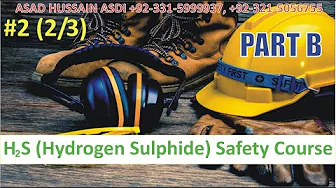IASP / NASP Confined Space Entry Course In Pakistan (Rawalpindi, Peshawar)
IASP / NASP Confined Space Entry Course
Confined spaces present unique challenges and hazards that require specialized training and expertise to navigate safely. Understanding the risks associated with confined spaces and possessing the skills to mitigate them is crucial for workers across various industries. Recognizing this need, the International Association of Safety Professionals (IASP) and the National Association of Safety Professionals (NASP) offer a Confined Space Entry Course aimed at equipping individuals with the knowledge and skills necessary to operate safely in confined spaces.
Course Overview:
The IASP/NASP Confined Space Entry Course is designed to provide participants with a comprehensive understanding of confined spaces, associated hazards, and the protocols for safe entry and work within these environments. The course covers a wide range of topics, including regulatory requirements, hazard identification, atmospheric monitoring, entry permits, emergency procedures, and rescue operations.
Course Benefits:
- Enhanced Safety Awareness: Participants gain a deep understanding of the potential hazards present in confined spaces, enabling them to recognize and mitigate risks effectively.
- Regulatory Compliance: The course ensures compliance with relevant regulations and standards governing confined space entry, reducing the likelihood of violations and associated penalties.
- Improved Operational Efficiency: Armed with the knowledge and skills acquired during the course, workers can execute confined space entry procedures more efficiently, minimizing downtime and increasing productivity.
- Reduced Incidents and Injuries: By implementing proper safety measures and protocols learned in the course, organizations can significantly reduce the occurrence of accidents and injuries associated with confined space work.
- Enhanced Emergency Preparedness: Participants learn how to respond effectively to emergencies such as gas leaks, equipment failures, or injuries, ensuring a swift and coordinated response to mitigate potential harm.
Study Units:
The course curriculum is structured into several key study units, each focusing on specific aspects of confined space entry safety:
- Introduction to Confined Spaces
- Regulatory Overview and Compliance
- Hazard Recognition and Assessment
- Atmospheric Monitoring and Testing
- Entry Permits and Procedures
- Personal Protective Equipment (PPE) and Safety Gear
- Emergency Response and Rescue Operations
Learning Outcomes:
Upon completion of the IASP/NASP Confined Space Entry Course, participants can expect to achieve the following learning outcomes:
- Ability to identify different types of confined spaces and associated hazards.
- Understanding of relevant regulations and standards governing confined space entry.
- Proficiency in conducting thorough hazard assessments and atmospheric monitoring.
- Competence in obtaining and completing entry permits in accordance with established procedures.
- Familiarity with appropriate PPE selection, usage, and maintenance.
- Skills to respond effectively to emergencies and execute rescue operations safely.
Who is this course for?
The IASP/NASP Confined Space Entry Course is suitable for a wide range of professionals working in industries where confined space entry is a routine part of operations. This includes but is not limited to:
- Construction workers
- Industrial maintenance personnel
- Utility workers
- Oil and gas industry workers
- Emergency responders
- Safety professionals and supervisors
Future Progression:
Upon completing the Confined Space Entry Course, participants may choose to pursue further training and certifications to enhance their expertise in confined space safety. Some potential avenues for future progression include:
- Advanced Confined Space Rescue Training: This course provides specialized training in rescue techniques specific to confined spaces, including rope rescue, confined space triage, and casualty extrication.
- Certified Safety Professional (CSP) Certification: Individuals seeking to advance their career in safety management may opt to pursue the CSP certification, which requires a combination of education, experience, and passing a comprehensive exam.
- Specialized Industry Training: Depending on their field of work, participants may benefit from additional training tailored to the specific confined space hazards and regulations relevant to their industry, such as maritime, construction, or petrochemical.
The IASP/NASP Confined Space Entry Course offers invaluable knowledge and skills essential for safe and efficient operations in confined spaces. By investing in comprehensive training, organizations can protect their workers, ensure regulatory compliance, and optimize operational performance. With the ever-present risks associated with confined spaces, continuous education and training remain paramount in safeguarding lives and promoting workplace safety.










